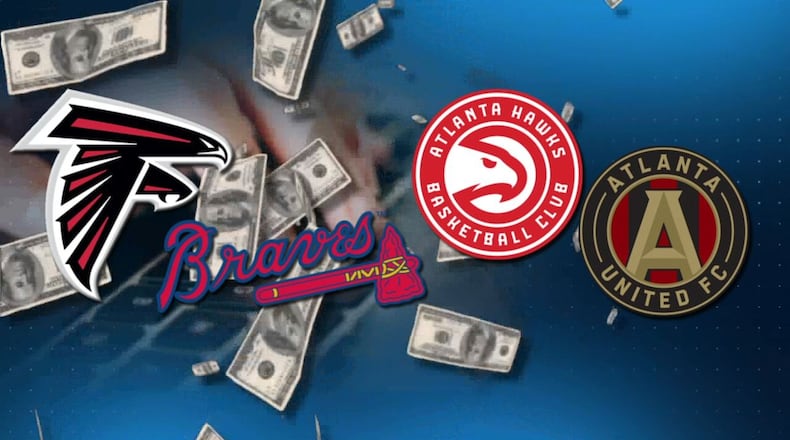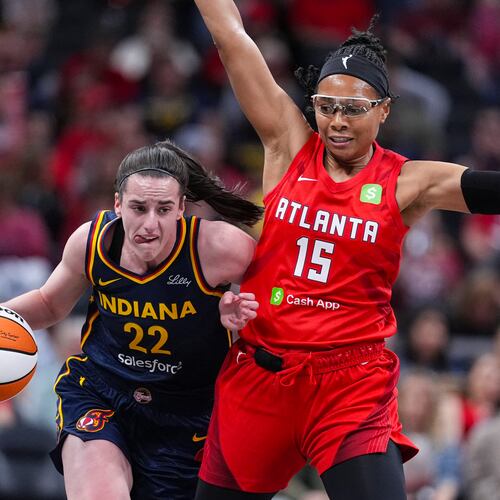As legalized gambling spreads across the country, Atlanta pro sports franchises contend Georgia’s lack of movement in that direction puts the local teams at a disadvantage.
The Braves, Falcons, Hawks and Atlanta United teamed up three years ago to push for online and mobile sports betting in Georgia, but their efforts so far have come up empty with the state Legislature.
A U.S. Supreme Court ruling in 2018 cleared the way for states to allow gambling on sports events if they choose to do so. More than 30 states now have, or are in the process of implementing, legal sports betting – Georgia not among them.
In recent interviews about the issue with The Atlanta Journal-Constitution, executives with the Atlanta teams expressed continued support for Georgia to join the list. But they also expressed frustration about the failure so far to achieve their goal and acknowledged they are reassessing their strategy.
“We are disappointed because we thought this is something that would pass, something we thought was good for Georgia,” Falcons President and CEO Rich McKay said. “And hopefully, when the Legislature gets together next year, it will be something that will pass.
“I see it as only upside to the state as far as revenue goes. And for us, the upside is fan engagement – connecting with our younger fans and keeping up with other states,” McKay said.
Credit: Jason Getz
Credit: Jason Getz
Hawks CEO Steve Koonin and Braves President and CEO Derek Schiller said teams in states with legal sports betting will benefit from an increase in fan engagement. In general, increased engagement can translate to improvement in TV ratings, digital audiences, attendance, team revenue and franchise values.
“One hundred percent, it will be a competitive disadvantage” for Atlanta teams if the state remains without legal sports betting, Koonin said. “Look at Tennessee; look at Indiana,” he added, naming two states that have it. “We are a bigger state, and I do believe we are falling behind.”
Often, the question of mobile sports betting has seemed entwined with casino gambling and other issues in Georgia politics.
“I think there are things that have nothing to do with the viewpoint of mobile sports betting alone that have likely caused some of the challenges,” Schiller said. “Legislation is not easy anywhere. In the state of Georgia, it’s not easy.”
For now, the local teams are trying to figure out their next move.
“The Braves are taking a step back and just trying to understand what’s the best way to go about this,” Schiller said. “There is no doubt the desire is as strong, if not stronger, than it was three years ago, but we’ve approached this basically in a similar way for three years now and have had the same outcome. So I think we’d be foolish not to try to think about what we can do differently. I don’t have that answer.”
McKay said the Falcons and Atlanta United, both owned by Arthur Blank, will “regroup” and “talk about strategies” with the other teams over the coming months.
“It’s so frustrating,” Koonin said of the efforts thus far.
Credit: Bob Andres
Credit: Bob Andres
The stances of the Atlanta teams are shared widely across U.S. pro sports, where almost all major entities – NFL, NBA, MLB, NHL, MLS, the PGA Tour and NASCAR among them – have entered into business deals with gambling-related companies in recent years. That represents a dramatic reversal for the leagues, which for many decades opposed any expansion of, or affiliation with, gambling interests.
McKay, an NFL executive for more than 30 years, is well familiar with that history. He said the NFL long was “scared” of integrity-of-the-game issues associated with gambling, “and the easiest way to avoid having any question on those issues was just to absolutely be opposed to it and not embrace it in any way, shape or form.” But after observing the regulation of legal gambling in Europe and elsewhere, “I think we all just kind of got over that hump,” he said.
“Look at how much money is being bet – and has been bet every year over the last 10 or 15 years – illegally,” McKay said. “Then why wouldn’t we bring it under a legalized system that is more regulated, more subject to the sunshine?”
Said Koonin: “When you have legal gambling, you have the greatest processes in place to manage the integrity.”
Pro sports’ complicated relationship with gambling was underscored in March when the NFL suspended Falcons wide receiver Calvin Ridley through at least the 2022 season for betting on games last year. Ridley’s bets reportedly were exposed by one of the NFL’s legalized gambling partners.
“I don’t want to comment on Calvin’s individual situation,” McKay said, “but I think one thing the league has been consistent on from an integrity-of-the-game standpoint is that we’re going to hold all league members – that includes the people who work for the teams, the players, the coaches – to a very strict standard when it comes to gambling: what is allowed, what isn’t allowed. And that is necessary to ensure the public has confidence in the integrity of the game.”
Despite the NFL’s business relationships with gambling companies, players betting on NFL games, even if legal, is still considered a severe violation of league rules. The NFL, like other leagues, is willing to navigate that delicate balance and make money from gambling interests.
The Atlanta teams already have sponsorship and advertising deals with Harrah’s Cherokee Casino in North Carolina and surely would land more such deals if sports betting were legalized in Georgia. Koonin said gambling-related businesses likely would be a top-10 sponsorship category but still far exceeded by some others.
Credit: Miguel Martinez for The Atlanta Journal-Constitution
Credit: Miguel Martinez for The Atlanta Journal-Constitution
It’s harder to quantify the extent to which legal gambling would boost the teams’ other revenue streams. “We are not going to collect the sports wager, and we are not going to receive a percentage of that,” Schiller said. But if the teams are correct about legalization leading to increased engagement because fans are more likely to watch games if they have bets on them, that is indisputably a monetizable commodity.
If the Braves’ and Hawks’ TV audiences grow on Bally Sports, for example, their broadcast rights fees ultimately would be worth more. Speaking of the Bally-branded regional networks, Koonin said: “How about this for irony? Braves games and Hawks games are brought to you on Bally’s, which is a sports gambling company. That’s how pervasive it is.”
The spread of legalized gambling has been a factor in the soaring valuations of U.S. pro sports franchises in recent years.
The Atlanta teams don’t necessarily envision someday installing betting kiosks in their venues. Schiller noted almost all fans already arrive with the device they would need to place mobile wagers: their phone.
For many Braves fans, Schiller said, the experience of attending games wouldn’t change with legalized sports betting. But other fans, he said, might make bets via their phones on the outcome of a game or on micro-elements within the game – whether a pitcher will strike out a particular batter or whether a batter will deliver a hit in a specific situation, for example.
“Whatever it might be, it just drives that further connection a fan would have to the game and to the team,” Schiller said.
“Our fan bases continue to get a little older, and as they do, you’ve got to continue to find ways to connect to the younger,” said McKay, who believes fans interested in gambling on sports skews toward the 25-to-40-year-old group.
The national trend leaves the local teams optimistic sports betting will be legal here – eventually.
“It will happen,” Koonin said. “There will be a time. I’m just hoping it is in the next (legislative) session or two, not in the next decade.”
About the Author
Keep Reading
The Latest
Featured




